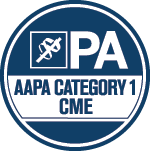
Purchase Options: |
2023-2024 DEA CME Collection
From “Street Drugs” to Adult Addiction and Everything in Between
Complete your DEA CME requirements through GAPA. This 8-hour CME lecture collection was created to provide PAs with the needed opioid and substance abuse hours now requirements by the Consolidated Appropriations Act of 2023 better known as the Medication Access and Training Expansion (MATE) Act.
Part I: Illicit “Street Drugs” versus Controlled Substances | Participants will be able to recall and discuss the history of substance use and abuse in the United States and how it impacts our society today; interpret the statistics of morbidity and mortality rates of Schedule I illicit substances and Controlled Prescription Drugs; and outline and summarize how these substances are used and their effects. |
Part 2: Drug-Seeking Behavior | Participants will be able to define the terms psychological and physiological dependency, overdose, and addiction; apply the 2022 CDC Revised Guidelines for prescribing controlled substances in their practices; appraise drug-seeking behavior and recognize the patient’s motivations to obtain medications for diversion and illicit use; employ history gathering “tip-offs” and examination techniques for identifying drug-seeking behavior. |
Part 3: Medication Review | Participants will be able to discuss the origin of the Controlled Substance Act of 1970 and how they have the authority to prescribe these medications; demonstrate a general understanding of psychotherapeutic medications and controlled prescription substances for pain; and explain the prescribing guidelines, mechanism of action, adverse reactions, and warnings for multiple Schedule II, III, and IV prescription medications. |
Part 4: Opioid Medication Crisis: How We Got
Here | Participants will be able to discuss the history of the opioid pain medication crisis in the United States from the 1990s to the present; recall the morbidity and mortality rates of controlled prescription medication abuse; and demonstrate knowledge of the pathophysiology of opioids on the CNS and how it initiates substance use disorder. |
Part 5: Interventional Pain Management:
Help Without Harm | Participants will be able to comprehensively understand chronic pain as a chronic disease process; recognize its impact on patients and their families; follow the interventional pain management treatment protocol; and evaluate when a referral is appropriate for their patients. |
Part 6: Addiction 101 | Participants will be able to appraise the most prevalent risk factors and theories for substance experimentation use, abuse, and substance use disorder; identify common substance use disorder triggers and reinforcers; acknowledge extrinsic and intrinsic biases individuals have regarding addiction; utilize the DSM-5-TR criteria to evaluate and diagnose those with substance use disorder; and discuss the stages of addiction, relapse, and recovery. |
Part 7: Adolescent Addiction: Myths,
Reality, and Hope | Participants will be able to differentiate between the myths and reality of adolescent substance use and abuse; recall the morbidity and mortality rates of adolescent substance use and abuse of adult-legal and illicit substances; comprehend the neurobiology of adolescents that make them particularly vulnerable to substance use disorder; apply clinical and diagnostic tools to identify adolescent addiction behavior and aid in recovery; and survey the effectiveness of substance use disorder treatment for adolescents. |
Part 8: Adult Addiction: Screening,
Intervention, and Treatment | Participants will be able to recall the morbidity and mortality rates of adult substance use and abuse of illicit substances, alcohol, and controlled prescription drugs; screen patients for adult substance use disorder and know when to intervene and offer referrals for treatment; understand the reinforcing effects of opioid withdrawal syndrome; apply the appropriate clinical use of substance use disorder medications during the patient’s detoxification and rehabilitation; and describe the value of supportive therapies for substance use disorder. |
Meet the Speaker
Alan Keating, MPAS, PA-C
| Alan Keating practices orthopedic medicine at Athens Orthopedic Clinic in Athens, GA. He has over 25 combined years of experience in orthopedics, pain management, and emergency medicine. Mr. Keating is a continuing medical education speaker and workshop instructor for AAPA state chapters. He graduated from the University of Maryland with a Bachelor of Science degree in Psychology and from Essex College’s Physician Assistant program. He earned his Masters of Physician Assistant Studies from the University of Nebraska Medical Center. Mr. Keating is the chairman and founding board member of the East Atlanta Advanced Practitioners Association. |
Accreditation

This activity has been reviewed by the AAPA Review Panel and is compliant with AAPA CME Criteria. This activity is designated for 8 AAPA Category 1 CME credits. PAs should only claim credit commensurate with the extent of their participation. Approval is valid from 10/2/2023 to 10/2/2024. AAPA reference number: CME-2010056.
